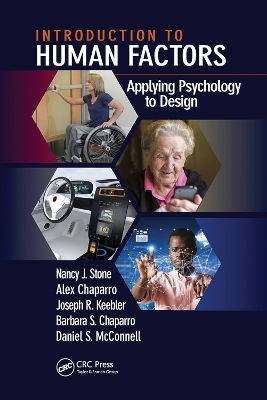
Introduction to Human Factors
CRC Press (Verlag)
978-1-138-37174-3 (ISBN)
Introduction to Human Factors: Applying Psychology to Design is a comprehensive, but accessible text that introduces students to the field of human factors and ergonomics. This book is intended for undergraduate students, written from the psychological science perspective along with various pedagogical components that will enhance student comprehension and learning. Given our passion for the field, and desire to better educate people about human factors because of its wide applications, we provide a text that can be used in psychology departments and can potentially reach a wider audience beyond engineering.
This book is ideal for those introductory courses that wish to introduce students to the multifaceted areas of human factors and ergonomics along with practical knowledge the students can apply in their own lives. Students from a variety of majors besides psychology (e.g., social work, education, engineering, computer science) will gain valuable information useful in their academic, professional, and personal lives.
Presents vignettes of real world events to introduce the chapter topic and links the chapter material back to the vignette
Provides the Application to Special Populations section at the end of each chapter. This will help students understand how to consider and design for special populations
Offers Critical Thinking Questions at the end of each pedagogical box that explores a topic or circumstance
Uses everyday real world events as well as military and aviation applications
Includes critical thinking exercises to help students apply the human factors principles to their own lives
PowerPoint® slides, Test Bank, and Activities are available upon qualifying course adoption.
Nancy J. Stone received her Ph.D. in experimental psychology from Texas Tech University. She created and taught the undergraduate Human Factors course at Creighton University. Nancy also was actively involved in the Human Factors and Ergonomics Society. Besides presenting on human factors pedagogical topics, and publishing an article on the needs of undergraduate human factors education, she also served as the Educational Technical Group (ETG) Program Chair and the ETG Chair. She then became a member of the Education and Training Committee (E&T). After five years on the E&T, and soon after she moved to Missouri University of Science and Technology as Department Chair, she became the Chair of the E&T of the Human Factors and Ergonomics Society, a position she held for five years. Her involvement in human factors education led to her invited article on human factors education in the Special 50th Anniversary issue of Human Factors. Nancy’s research is in the areas of environmental design, teamwork, and student learning. Alex Chaparro received his Ph.D. in experimental psychology from Texas Tech University and completed a postdoc at Harvard University in the departments of Psychology and Applied Sciences. He is a full professor in the psychology department at Wichita State University where is a member of the human factors program. He has taught human factors courses at the undergraduate and graduate level and is currently director of the Regional Institute on Aging. Alex is a member of the Human Factors and Ergonomics Society and the Gerontological Society of America. His research concerns the effects of distraction and aging on driving performance. Joseph R. Keebler, PhD has over 10 years of experience conducting experimental and applied research in human factors, with a specific focus on training and teamwork in military, medical, and consumer domains. Joe currently serves as an assistant professor of human factors and systems at Embry Riddle Aeronautical University. Joe has partnered with multiple agencies and institutions in his career, including: Army Research Laboratory, Research Defense Engineering Command, Office of Naval Research, Blue-Cross Blue-Shield, AHRQ/DoD TeamSTEPPS program, University of Kansas Medical School, Federal Aviation Administration, Children’s Mercy Hospital, Sedgwick County EMS, University of Miami/Jackson Memorial Hospital, and the Transportation Security Administration. Joe has led projects aimed at the implementation of human factors in complex, high-risk systems, to increase safety and human performance. This work includes command and control of tele-operated unmanned vehicles, communication and teamwork in medical systems, and development of simulation and gamification of training for advanced skills including playing the guitar and identifying combat vehicles. Joe’s work includes over 50 publications and over 60 presentations at national and international conferences. Barbara S. Chaparro received her Ph.D. in Experimental Psychology from Texas Tech University. She is the director of the Software Usability Research Laboratory (SURL) and the coordinator of the Human Factors doctoral program at Wichita State University. She has taught Human Factors and Research Methods at the undergraduate level and Human Factors Methods and Human-Computer Interaction at the graduate level. She is a long-time member of the Human Factors and Ergonomics Society and chair of HFES graduate Accreditation. Her research interests include applied human-computer interaction, usability evaluation methods, and mobile computing. Daniel S. McConnell received his PhD in sensory psychology at Indiana University and completed a postdoc in sensorimotor performance at the University of Pennsylvania. He is currently a Lecturer in Psychology at the University of Central Florida (UCF), where he is an affiliate of the Applied Experimental Human Factors program. At UCF, Dan has taught multiple graduate and undergraduate courses in Human Factors and experimental psychology, while also working as a researcher in the Technology and Aging Laboratory and collaborating with partners at Microsoft and the UCF Institute for Simulation and Training. His research focuses on the visual control of reaching and the visual perception of biological motion, and the application of these findings to remotely operated vehicles and human-robot interaction.
Preface
About the Authors
Chapter 1 Introduction to Human Factors
Chapter 2 Research Methods
Chapter 3 Visual, Tactile, and Olfactory Displays
Chapter 4 Audition and Vestibular Function
Chapter 5 Methods of Evaluation
Chapter 6 Attention, Memory, and Multitasking
Chapter 7 Decision-Making
Chapter 8 Motor Skills and Control8.1 Chapter Objectives
Chapter 9 Anthropometry and Biomechanics
Chapter 10 Environmental Design
Chapter 11 Human Error
Chapter 12 Future Trends in Human Factors
Index
| Erscheinungsdatum | 21.01.2019 |
|---|---|
| Zusatzinfo | 115 Illustrations, black and white |
| Verlagsort | London |
| Sprache | englisch |
| Maße | 156 x 234 mm |
| Gewicht | 694 g |
| Themenwelt | Kunst / Musik / Theater ► Design / Innenarchitektur / Mode |
| Technik ► Umwelttechnik / Biotechnologie | |
| ISBN-10 | 1-138-37174-2 / 1138371742 |
| ISBN-13 | 978-1-138-37174-3 / 9781138371743 |
| Zustand | Neuware |
| Haben Sie eine Frage zum Produkt? |
aus dem Bereich


